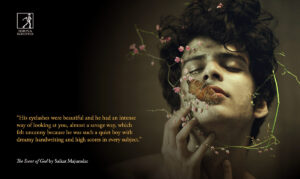Saikat Majumdar


An excerpt from an early draft of the manuscript that was dropped from the final version
The next week, Hari Swami, the school headmaster, ran away from the monastery to live with a woman. She was the widowed mother of one of his favourite boys.
It was as if a silent bomb had gone off in the ashram. It had let out a venomous gas that froze everyone into a grotesque and horrifying laughter and locked our jaws. We couldn’t stop talking about it and we had no words with which to say anything.
The news threw Somesh into such a storm as such I’d never seen in him. Surely because we were now in Class IX and fifteen years old? One cannot remain children forever.
But it was news that drove you mad. The charismatic monk, had left the order to return to life. And nobody tried to hide the fact that he had eloped with Abir’s mother, the pretty widow who worshipped him. He hadn’t cared to hide anything.
That afternoon Somesh caught up with me as I was sneaking away to the Central Library in my football outfit. He knew I never went to play but hid game time out in the library. Somesh was a terrible player and his body plopped on the field like a lump of white dough but he loved to play anyway and people loved to boo him on the field. But he always encouraged me to spend more and more time in the Central Library looking up erotic Bengali novels that our parents read but hid from us. Since he couldn’t be there, he usually asked me to tear out the juicy pages for him but often I found pages missing already, especially when the stories were about to get juicy so I was not sure who did it or if Somesh had other people working for him as well. But Somesh also edited a handwritten magazine that was circulated in Love Hall where he wrote many stories and poems about young men who took shot drugs in their veins and where I also wrote stories which Somesh always criticized me for copying Tagore.
“I can’t believe Harida’s gone!” Somesh said pushing his glasses back. “He was the ashram to me.”
“I didn’t know monks could give up their saffron,” I said. “And go back to live.”
“Not just any monk. Harida.” Somesh said.
I could never quite grasp why Somesh was obsessed with Harida. I mean, he was an important monk and all that, the headmaster of the school, but so many monks and teachers towered over our life, what was there to think about? He was a good-looking monk? What was that supposed to mean? How were monks good-looking? They shaved their heads and wore nothing but saffron. I used to ask Somesh.
He found Hari Swami striking, his rustic accent magnetic. I did not like that monk. He moved around with his chain of smooth boys with smoother mothers. Nirmal Mirani hated him but he tried to hide his dislike from me. But Somesh needed to say wild things and usually he needed some hero figure. But Hari Swami? And Somesh who wrote stories about drugs and doomed love? He was even under the spell of the way Hari Swami walked, which was truly strange. One hand deep inside the pocket of the saffron robe and the other swinging like a pendulum. That’s his style – you know it’s him from miles away, Somesh would say. Seriously?
Today, Somesh was blown to bits.
“He ran way with that blabbing woman. She wears those horrible sleeveless blouses.”
“What?” I started laughing. “That’s why you hate her?”
“They are ugly things. I told you. Plus that woman used to giggle too much before Hari Swami.”
“People do all kinds of weird things before the monks,” I said. “Sanjib Ghosh’s mother crawls twenty feet – the whole block – dragging her head across the ground and then at Shashanka Swami’s feet.”
“The charlatan swamis like that sort of thing.” Somesh said. “Licking the ground and licking their anuses. Hari Swami was something real. I don’t know what he was exactly but he was real.”
“Why do you say he was? Not like he was dead or something. Someone saw him in a local train the other day. He wears white dhotis and kurtas now and has a head of thick black hair.”
I felt it was a bit strange that Hari Swami would give up saffron to wear white. White was the color of brahmacharya. You had to live in it for twelve years before you earned your saffron. And now he was married again, he was in white? But…did he marry Abir’s mother? Or what?
“God, people see him everywhere now,” Somesh spat in disgust. “Arun Ghosh said that he saw him in the Garia market haggling over fish eggs. Fucking people!”
It was dreamlike. Hari Swamy in a white dhoti and kurta. Hari Swami in the fish-market, haggling with fishmongers. Sitting in the local train packed with people, one of the commuters. Perhaps he had to stand, since now no one would give up their seat for him as he wasn’t in saffron robes. Not that he traveled in local trains; he was the headmaster and there was a car ready for him whenever he had to go out. But now? Did he take the train? Somehow I imagined him in a train, sitting in the middle of people, and singing a song. Nobody had heard him sing. But it was true that he had a beautiful voice, broad and open-air, and he spoke nonstop with a slight stammer and a rustic twang that made everything flow. Somesh had an odd way of looking at things, but he was right.
There was air and sunlight everywhere. Hari Swami had left. Given up his saffron robes, the garment of renunciation. Walked out of the ashram gate, past its high walls. He had left with Abir’s mother, and Abir too, had left the school.
But Somesh suffered. Today he didn’t want to go to the playground. He was also mad at Abir’s mother.
“She was always playing with her hair or tying her bun before him. In her tiny sleeveless blouses.”
Sleeveless blouses were an explosive subject with many of the boys from the Bengali medium, especially those who came rural or suburban places. Somesh was strange about this. He wrote stories about drugs and stunted sex in the park but he had forbidden his mother to wear sleeveless blouses. She sometimes wore them at home but she always remembered to wrap the sari-end around her bare upper arms when Somesh was at home. I found the story funny but some reason couldn’t stop thinking about it for many days.
“She was a fast woman.” Somesh said. “And she was crazy about Hari Swami.”
Somesh couldn’t make up his mind. He was thrilled that Hari Swami was now having sex and buying fish at the market everyday but he couldn’t take it that he wasn’t here anymore and that he left with a woman who lured him with her tiny sleeveless blouses.
“He was quite a man.” Somesh said. “I hate all the monks here but he was different.”


An excerpt from the published book (from the Chapter “The Lotus Skin” pp. 153-155)
Yogi walked to his room. The warden’s room was the first one in the ground floor of the hostel. The curtains were drawn. Heavy saffron curtains that sat still.
He drifted into a familiar fragrance: sandalwood and flower and incense and a soft yellow orange sheen all over the room. But there was someone else in the room. She sat on the chair across Kamal Swami’s study table. The Swami sat at his usual place.
She looked at Yogi sharply as he entered and he knew he hadn’t seen anyone quite like her here at the ashram. She was probably his mother’s age but had the eyes of a young college student, eyes which searched the room keenly. She wore a cream silk sari that looked expensive but one which was borderless like that of a widow. Yogi smelled camphor and something else, something beautiful and pointed, like clove. He stood still at the door.
‘Kire, what is it?’ Kamal Swami smiled at Yogi. His cheek creased with the familiar smile and a deep happiness drifted back to Yogi.
‘I…I,’ Yogi tried to say something but the smiling eyes of the woman made him freeze.
‘Just wait outside,’ the Lotus smiled again. ‘I’ll call you.’
Yogi stepped out and stood behind the curtain.
‘There was something in that voice,’ the woman’s voice floated through the curtain.‘She always said, that made her want to give up everything in the world.’
‘He was a lion of a man,’ the Swami said in a smiling voice. ‘But she too was special, to be able to hear his call.’
‘And follow him till the end of the universe.’ She responded.
‘Helena was a very special woman.’ He said. ‘How many people of her birth and wealth feel that their calling is with the world’s poor?’
‘But how could she say no to that voice? Did she have a choice? That bronze skin and those deep eyes? Just look.’
Her eyes, Yogi knew, had stopped at the giant portrait of the Great Saffron One on the wall of Kamal Swami’s room.
The Lotus didn’t say anything. Was he smiling?
‘Tell me Swami,’her voice softened. ‘Was that all for her?’
‘Men like him come to the earth for just one reason,’ the Lotus also spoke in a softer voice.
‘I know,’ she said. ‘She was a miracle woman. A goddess hailing from Parisian high society and making India’s poverty her own. But would she have come here if she didn’t love him?’
‘She loved. There was so much love in her heart.’
The curtains brushed Yogi’s cheeks. There was another kind of music in there. Kamal Swami’s voice was like a conductor’s hand; the beautiful woman’s voice rose and fell as the Swami’s voice asked, as if the Swami was telling her how to talk, and how to feel.
But her words fought him off.
‘But when a woman hears your voice and looks into your eyes and decides to turn her life upside down, a man must know something, doesn’t he? You know, don’t you?’
Her voice shivered.
‘If I touch you,’ her voice softened. ‘Like this. And this and this, tell me,’ she asked. ‘Don’t you know?’
‘I know all there is to know,’ Kamal Swami’s beautiful voice boomed and Yogi longed to see his smile. ‘He was a man but in form. He was but the Great Spirit.’
‘The form too, feels, does it not? Tell me it does.’ The woman paused, as if taking a deep breath. ‘Is it true? Is it true that once while they were traveling together, just the two of them, she had…’
‘No, Helena!’Suddenly Kamal Swami’s voice became warm. ‘ He had said, reminding her of her great calling on earth right then. Never forget why you’ve arrived in this world. Never!’
‘No?’ She sounded almost hurt. But strangely, Yogi felt if he could see her face he would see her smile.
‘No,’ he said. Yogi couldn’t help but part the curtain, look inside. The woman’s hand lay on Kamal Swami’s palm like a dead branch. ‘Gold and women. Women and gold. They cannot touch the brotherhood.’
He had never seen Kamal Swami smile like that. Never like that. He felt a sharp ache, as if the bones inside his chest had shifted suddenly. He knew nothing about the Lotus.
He turned and walked back to his room.
Excerpted with permission from The Scent of God, Saikat Majumdar, Simon & Schuster India, 2019.


Q&A
- Reading The Scent of God I felt that it is a story without a story because we don’t know where it is heading until the last chapter. Moreover, the last chapter leaves us in a sort of bewilderment and yet with a sense that perhaps it could not have been anything otherwise. Those who have lived in Calcutta (not Kolkata, as I mean both the place and time) will encounter a strange familiarity with the spaces you depict in the novel but with a gated estrangement because the bildungsroman develops mainly within an institution owned by a monastic order. In many ways in the novel the readers are taken into a world where trespassing is not allowed. In The Firebird the world depicted was hidden, in The Scent of God the world depicted is secluded and in both it is the child’s point of view of the adult world that pivots the novels. How does your creative process bring all these together?
SM: You know, what you say about the ending of the novel is the best thing an author can imagine: “bewilderment and yet with a sense that perhaps it could not have been anything otherwise.” Such a contradiction is the best conclusion for fiction – shock combined with a sense of inevitability. That’s a beautiful description. But the question you ask is very complex and covers the whole of the creative process, as you know as a poet yourself. Good art, I think, marks a ceaseless tension between the alien and the familiar; it evokes empathy but shocks at the same time. As a novelist I’ve always been intoxicated by place, its smell, touch and intimate cracks. In The Firebird it is the warmth of the spotlight, the darkness of the wings beyond the stage, and the sugared spite of narrow north Calcutta lanes. In The Scent of God it is a space guarded from the dust and noise of the city – at least in the first part of the novel.
It was the intoxicating nature of this monastic space that drew me to this story, where the smell of flowers and the music of bhajans seduce you into a trance even as your knees touch those of another boy; perhaps your fingers curl up inside one another. This is a boarding school for teenage boys, and as their bodies move through puberty, they crave the intimacy of human touch, not caring whether it is the touch of a boy or a girl. But the enclosed monastic space holds the promise of a certain kind of intimacy that cannot come out in the dusty daylight of the city. This is the choice the protagonist faces – between the gritty city of street violence and politics with men and women, and the idyllic, saffron world of the all-male ashram which offers a different kind of love. The duality of shock and empathy that you felt in the novel’s ending comes from the choice made by the protagonist.
- Of the two excerpts that we publish in EKL Review, one is the privileged chapter (“The Lotus Skin”) because it becomes part of the novel and the other is the expunged one because it did not enjoy the privilege of being included in the novel. These two privileged and unprivileged excerpts, as you say, mirror each other. In fact the whole novel deals with dualisms – of staying and leaving, of acceptance and renunciation, of the ashram and the village, of the body and the soul. In this dualistic encounter there will always be the road not taken. What does the author say about it?
SM: The monk, the Sannyasi, becomes an enigmatic figure in the novel – Kamal Swami, nicknamed the Lotus, is deeply charismatic and yet shadowy and ominous. The protagonist, who wants to become a monk, watches Kamal Swami play football and cricket and dreams about his saffron-sheathed muscular arms, which he wants to both possess and become. This monk mentors young boys, touches them with affection. But the magnetism of the monastic figure extends to men and women alike. Female devotees are drawn to him, to the power of his words, to his bronze skin and baritone voice – including European women who come to follow his path, under the spell of his charisma.
What about the monk? How does it all move him? Does he know of the seductive spell he casts on men and women? What does it do to him? When people look at him, dazed by the intimacy of their adoration? This novel asks some probing questions about the meaning of monastic celibacy. Its main focus is on the kind of intimacy that holds the brotherhood together. And yet, once in a while, a monk steps out, leaves the order, decides to enter into an intimate relation with a woman, become a householder who goes to the market to buy fish like everyone else. That is the duality of the ashram and the city, the monastery and the marital home, abstinence and conjugality. This is also the big decision in the novel. But underneath it, we cannot help but wonder, are these things as starkly in opposition as they appear to be? Are they really a duality, or do they melt into one another sometime? Is it possible to have an abstinent conjugality? A marital monastery? Because, in the end, the scent of God is always a scent, a sensory, seductive aura, no matter how abstract its source may be.
~~~~~~~~~~
Acknowledgement of Images: Pinaki De